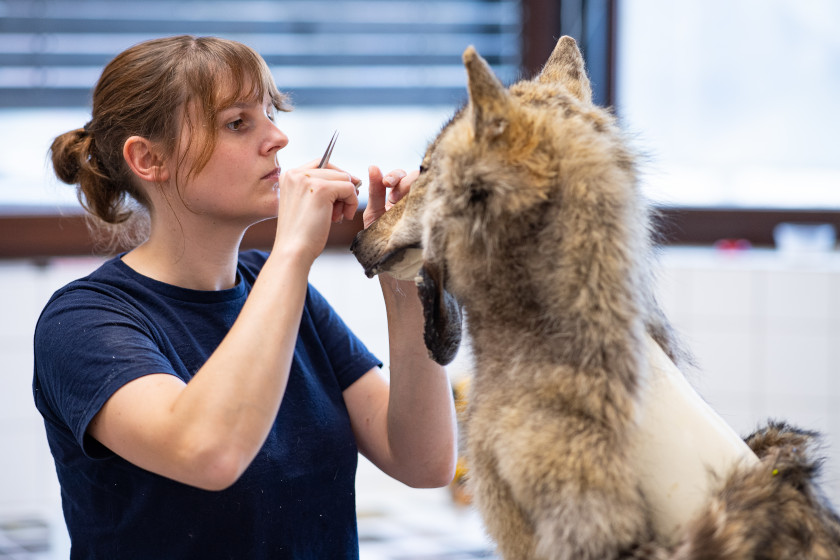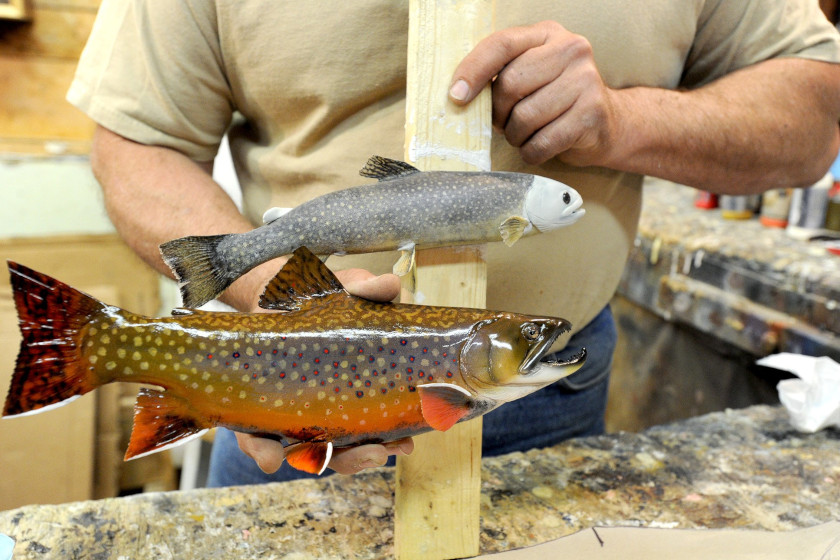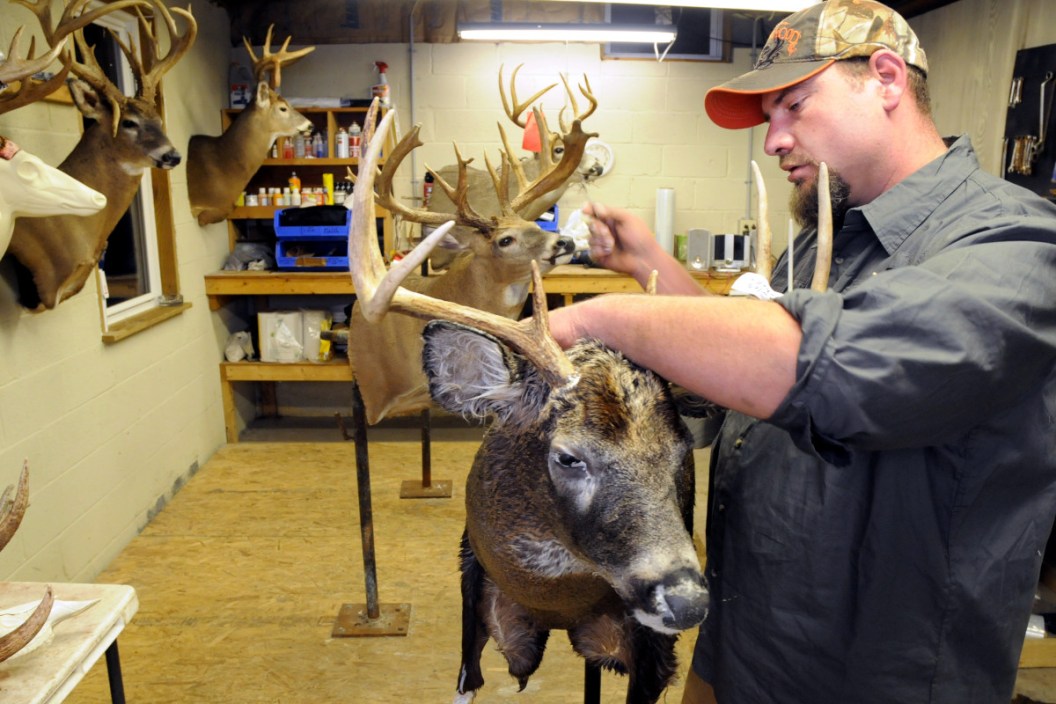This is what to expect from the typical taxidermist job.
Perhaps the most unique career path for any lover of the outdoors to take is one in taxidermy. The careful art form of preserving harvested game animals and fish is something that not everyone is likely cut out to do. It takes a lot of proficiency with one's hands and an artistic eye.
There are also a lot of technical skills involved in the tanning and sculpting of the finer details. Make no mistake, the taxidermy business is not an easy one.
The good news is the education requirements are usually minimal and the work is usually solo. That makes it a great option for those who don't like the usual social chatter of an office, or who simply want to be self-employed.
Many often wonder just how much a taxidermist makes. We'll look at that and some other aspects of the business you should consider before making the plunge into this unique job.
Education Requirements

Getty Images: picture alliance
The good news about taxidermy is that the educational requirements are minimal. There are plenty of successful taxidermists who got started right out of high school and now make a fine living doing it. However, if you start talking to many experienced taxidermists, you'll find that a little extra education does not hurt, especially if you want to make it a full time career. While education may not be necessary to get started, it may prove vital if you want to be successful.
If that's the path you want to take, it's a good idea to take classes on taxidermy. These are sometimes offered by small community colleges, although there are also a few dedicated taxidermy schools out there. If you start shopping around, you'll find the tuition for one of these courses varies between $2,000 to $8,000 and the courses generally only run around a month at most. It may be expensive, but much less than a typical college degree.
After that, you may want to take on an entry level role as a taxidermist's assistant before opening your own business. This gives you the chance to learn many of finer points of the art, things like how to treat animal skins, how to mount antlers on a form, and how to add details around the eyes and ears. Keep in mind that being an artist is part of the job description. If you don't consider yourself the creative and artistic type, it may not be the career for you.
What is the average salary of a taxidermist?

Getty Images: Portland Press Herald
If you start asking taxidermists about how much they make, most will say that it's not likely to be a career where you can get rich. Not unless you are supremely talented and earn a reputation that usually comes with years of experience. Salary Expert puts estimates for a typical taxidermist at $47,159 a year, or roughly $22.67 an hour.
More experienced taxidermists earn an average salary just under $60,000 a year. Taxidermy Schools notes that a taxidermist salary usually depends on the person. This is one of those careers where you'll get out of it what you put into it. We've also heard of taxidermists who regularly make $100,000 or more, although that kind of pay usually comes from taxidermists who have tons of clients and years of experience.
"If you're lazy, (and we're being honest here)... you won't make a lot of money. No matter where you live or what the economy is like," Taxidermy-Schools.net writes on their website.
A big part of a taxidermist's success is probably going to depend on the types of game available in an area and the versatility of the taxidermist's skills. Someone who lives in a state like Wyoming with whitetails, mule deer, pronghorn antelope, and elk will likely have more opportunities for work than someone in New York where the only big game animals are whitetails.
You'll also have more opportunities for work if you mount waterfowl, upland birds, turkeys, and fish. Of course, mounting these animals may require a whole different set of skills and you'll have to weigh the pros and cons of taking the time to learn them. Taxidermy-Schools.net notes that a taxidermist with a good reputation can likely earn a good living during the busiest parts of hunting season.
"In ideal conditions, a motivated taxidermist can possibly earn up to $10,000 a month during their busy months, and average over $5,000 per month over a 12-month period," the site writes.
They also note that taxidermists can make extra money by doing smaller projects like European mounts and antler plaques. Don't be afraid to get creative and diversify. The more animals you can mount, the more opportunities to make money there will be.
Other things to consider about a career in taxidermy.

Getty Images: Future Publishing
One other thing to keep in mind with these average taxidermist salary estimates are overhead costs. Things like costs of forms, tools, and tanning equipment are all going to cut into your profits. You will also need to consider things like rental or mortgage fees for your workspace. Depending on the cost of living in your area, the average salary range of a taxidermist will go further than others.
We have heard of plenty of taxidermists who have full time day jobs and only work in taxidermy in their garage at nights part time. There are plenty who have done this until they have built up a sufficient clientele and have earned a reputation for solid work. The better your reputation, the more you can usually charge. Some people take up taxidermy later in life as a side job after retirement.
Keep in mind there's a lot of competition for taxidermy in some areas. You'll find many experienced taxidermists will recommend you shouldn't compromise your prices to compete. The cream usually rises to the top, and if you produce good work, word will get around and the customers will come to you.
There is one bit of good news in that the taxidermy business licensing requirements for states are usually very affordable. Here in Michigan, a taxidermy permit is only $100 and is good for three years. Some states, like Texas, do not require a license or permit at all, although you will need a permit from the U.S. Fish and Wildlife Service to have migratory game birds in your possession if you are mounting them.
While the licensing for most states is simple, they do usually require taxidermists to keep meticulous records of every animal that comes through their business. You are also usually required to keep those records for several years. Do your homework to determine exactly what laws and regulations you need to follow before trying to start a business. Finally, you will need good accounting and bookkeeping skills to make sure you are earning a profit with your business. This kind of stuff also comes into play at tax time. If you've never been self-employed before, you'll have to file your taxes differently than you have in the past, and that sometimes takes a little getting used to.
In short, one can make a good career in taxidermy if they are willing to work for it. We won't lie. It's not a career for everyone, and success isn't likely to come overnight. You're probably not likely to get rich doing it unless you enter a bunch of competitions and become a recognized champion. Regular winners of taxidermy competitions usually have their work in high demand. However, most taxidermists do it more out of a pure love for the craft and the enjoyment they get out of preserving the memory of a harvest for a hunter or fishermen than they do the salary.
For more outdoor content from Travis Smola, be sure to follow him on Twitter and Instagram For original videos, check out his Geocaching and Outdoors with Travis YouTube channels.
READ MORE: PICKING A TAXIDERMIST: 6 THINGS TO LOOK FOR




